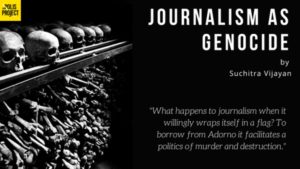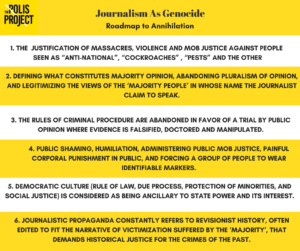“Stalking the Story” and “Journalism as Genocide”
It is an uncanny coincidence that today two seminal articles have been published online analysing journalism as we know it today and its complicity with the powers that be even if it means resorting to unethical practices and compromising their positions. Both articles are by reputed journalists. The first is by Rafia Zakaria in the Baffler called “Stalking the Story” or what she sees as the calling card of predator journalists. The second is by Suchitra Vijayan as a part of The Polis Project called “Journalism as Genocide” tracking hate speeches, fake news etc as propaganda tools to ultimately result in hate crimes such as genocide or other forms of violence like lynchings and the attempted assassination attack on student activist Umar Khalid.
articles are by reputed journalists. The first is by Rafia Zakaria in the Baffler called “Stalking the Story” or what she sees as the calling card of predator journalists. The second is by Suchitra Vijayan as a part of The Polis Project called “Journalism as Genocide” tracking hate speeches, fake news etc as propaganda tools to ultimately result in hate crimes such as genocide or other forms of violence like lynchings and the attempted assassination attack on student activist Umar Khalid.
Umar Khalid
Posted by Nadeem Khan on Monday, August 13, 2018
Rafia Zakaria says in her concluding remarks:
The predator journalist is a creation of the War on Terror, whose narrative requires all that is Western to be anointed while everything else is reduced as a tool in service of it. The journalist who sets out to “unravel” its mysteries is thus as much a warrior in service of this narrative as the soldier who visibly enacts its agenda. All this would at least be less objectionable if it were owned and admitted, if those searching for rape stories among Yazidi women or taking pictures of women attending secret schools did not pretend to be journalists or aligned with a code of ethics that requires consent of subjects, respect for their humanity, and a commitment to confidentiality.
The lethal aspect of the predator journalist is the pretense, the implication to readers that they are in fact “objective,” bound by ethics, even when no such moral restraint inhibits their actions. This is a debasement of the idea of truth, now reduced to an outmoded goal of journalisms past, whetted by a now-debunked idealism. The remainder is a crass predation, a reduction of insight to access, and deeply reported stories to orchestrations of pressure and predation on hapless subjects. In the theater of the War on Terror, the United States need no longer send predator drones; it can avail the talents of predator journalists, whose sly shape-shifting is a much sleeker and at times a more lethal weapon.
Suchitra Vijayan says:
Upon analyzing witness testimonies from the Nuremberg, Yugoslavia and Rwanda trials, two things become increasingly clear. First, truthful reporting of facts, analytical investigation of issues, and a stand against violence by journalists in all these instances could have both changed the behavior of the perpetrators, and in some instance even prevented the slaughter. Second, when airwaves become a platform for ideological, socio-religious-nationalist populism, there are clear roadmaps with milestones and perfected patterns of hate that lead to eventual violence and destruction of a society. Some of these milestones include:

While the list enumerated above is a repetitive pattern of behavior gathered from over hundred witness testimonies from Nuremberg to Rwanda, their relevance resonates for India today, as we are birthing a new dystopia of hate and bigotry. This list holds up a haunting mirror to the ugliness on display and the vileness employed by some Indian news channels, anchors, and journalists. It is as much a war over the minds of the people, as it is a war to enact extrajudicial and unconstitutional laws that encroach into and legislate the private lives of citizens. The absolute essence of this priming is the stamping out of pluralism in all its forms – pluralism of ideas, opinions, faiths, beliefs, memories, myths and even gods.
…
Sudhir Chaudhary, editor, Zee News, in an interview to Outlook magazine stated that: “It has become necessary for media houses to take a stand on certain issues. It has to be a nationalistic approach. That benefits the people of India. What do you call neutral and secular? No one is neutral anymore. I will pitch for a nationalistic reporting, …” He further states, “If you want to live in India and want the breakup of India, then why do you want to live here? Leave the country and go.”
What happens to journalism when it willingly wraps itself in a flag? To borrow from Adorno it facilitates a politics of murder and destruction.
While nationalism will continue to mediate many facets of our life, it cannot become the prism through which we understand the complexities of the world. Chaudhary, and many like him, hold an immense power of persuasion and present a position of unthinking hawkish nationalism that uncritically propagates a retreat to banal patriotism. This excludes the possibility of criticising the state and its political projects. Journalism is not the witch’s brew from Macbeth, and journalists cannot become the agents of chaos and conflict. Journalism demands detachment and objectivity that allows for dissent, disagreement, and freedom of expression. In the absence of such ethics, it clears the ground for violence and does a great disservice to the democratic way of life.
While handing down its judgment in the media trial, the ICTR rightly criminalized the hate speech of a powerful media against a vulnerable minority. The great fight for individual humanity against crimes by the state – and the journalists who defend it – has to begin with accountability. To rephrase what Rwandan journalist Thomas Kamilindi testified at the war crimes’ tribunal, how should we hold journalists accountable for their actions, and if need be prosecute them, if they knowingly caused harm, and incited violence. We must find a way to articulate and respond to such abuses of power without violating the principles of freedom, which are an indispensable cornerstone of democracy.
14 August 2018
